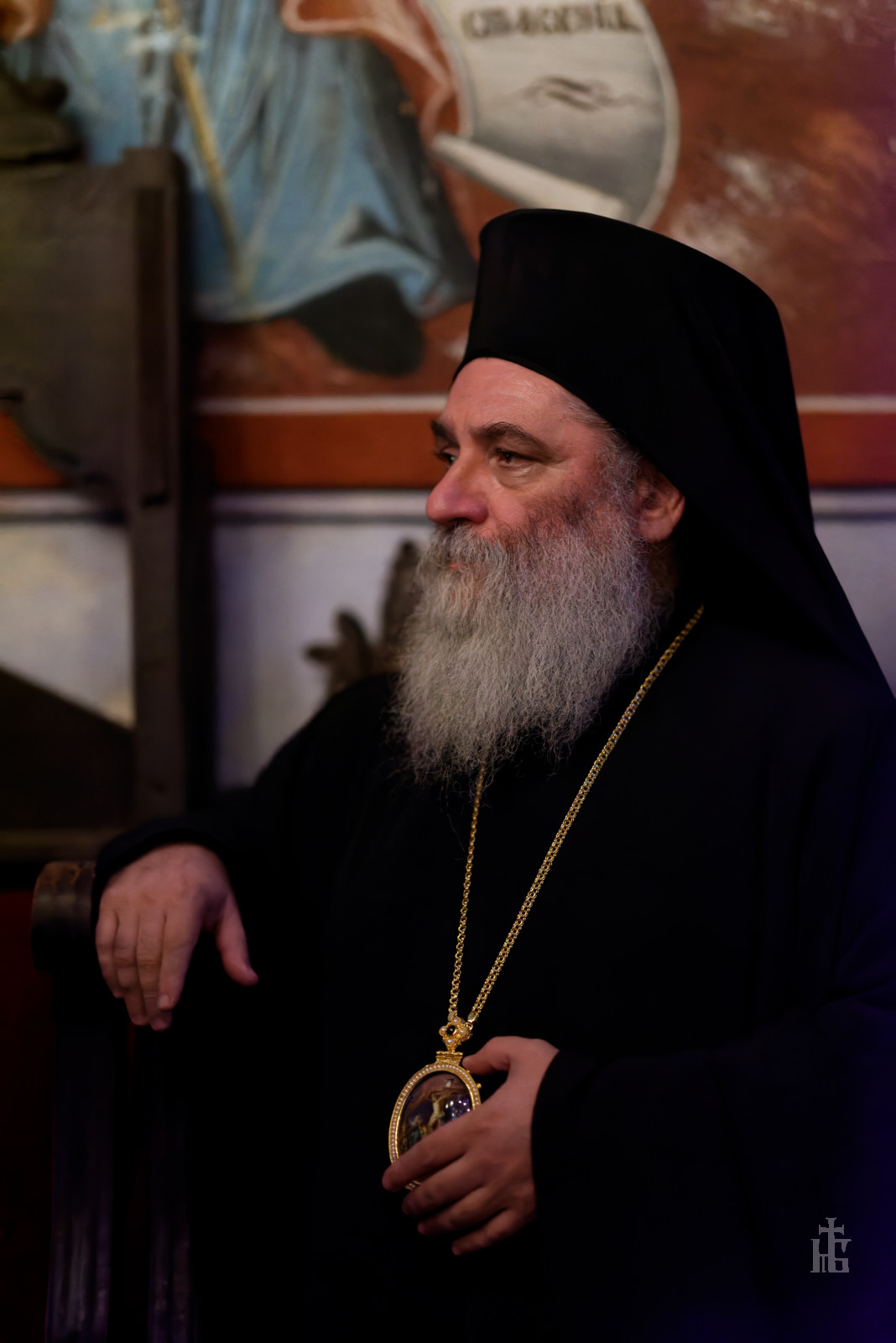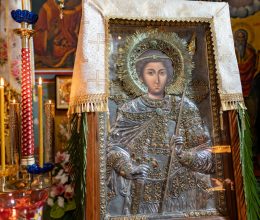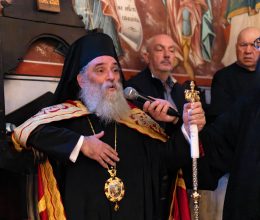Address by His Grace Bishop Parthenius of Antania, Abbot of the Holy Bigorski Monastery, at the Vespers Service for the Feast of the Exaltation of the Holy Cross, September 13/26, 2023 A.D.
Your Eminence,
Your Grace,
Reverend Mothers and Abbesses,
Honorable and Devout Fathers,
Beloved Brothers and Sisters in Christ,
The outstretched arms of the Crucified One on Golgotha gather us once more into sacred unity, as we celebrate the great Feast of the Universal Exaltation of the Precious and Life-giving Cross—a feast of both historical and supra-historical significance that inspires awe and uplifts the soul. On this day, with solemnity and spiritual radiance, we are reminded of the unparalleled sacrifice and tireless love of our Savior, the Lord Jesus Christ.
This feast transforms those who celebrate it with love into vessels of God’s peace and love—a mission embodied in the Cross of Christ. The Cross, beloved, is not merely a symbol of suffering and death; rather, it is much more: it is the banner of the Resurrection, the anchor of hope, and the seal of God’s inexhaustible love. The Cross calls us to a life of service and humility, from which arises enduring and genuine joy. It is the path by which we become followers of Christ. The Cross is the emblem of our identity. By bearing our personal cross in life, we imitate our humble Savior, the King of kings, who chose not a throne, but the Cross. In this, He gave us the profoundest lesson in the virtues of humility, selflessness, and unconditional love.

The world, with its ceaseless challenges, afflictions, conflicts, and pains, thirsts for the message of the Cross. The marginalized, the suffering, those wounded by sin, our environment, and all creation yearn for the life-giving reconciliation and renewal that emanate from the Holy Cross. As followers and worshipers of the Cross, it is our duty to spread this message and to bear witness to the resurrectional meaning of the Cross in our daily lives.
The way of life that flows from the Cross and Resurrection within the Church constitutes a culture of encounter. The Cross is, first and foremost, the place where God and humanity meet. The foot of the Cross is where Heaven touches Earth, where divine love embraces human frailty to restore the original dignity and beauty of man. It is up to us to extend this encounter into our lives. For when the Cross unites Heaven and Earth, it means that we, as worshipers of the Cross, must learn to bridge divisions, heal ruptures, and be peacemakers, embodying Christ’s prayer that “they may all be one” (John 17:21). To carry the Cross in humility is a blessing not only for oneself but also for one’s entire surroundings, for when carried faithfully, it serves as a beacon, illuminating every encounter with our fellow man in everyday life.
It is an exceptional blessing for today’s celebration at this Sacred Monastery of the Glorious Great Martyr to be graced by the presence of our dear and beloved brother in Christ, His Eminence Metropolitan Kyrillos of Imbros and Tenedos. This holy hierarch of Imbros, a tireless servant of the Lord and a proven friend and supporter of our Church, comes to us on the Feast of the Holy Cross from a crucified Church—one that continually proclaims and lives the Resurrection. He comes from the Mother Church of Constantinople, which, though crucified, remains vigilant over her children, nurturing them to flourish in goodness and grow in freedom and truth.
Our gratitude to His All-Holiness Ecumenical Patriarch Bartholomew is beyond measure for once again sending us his paternal blessing through the Archbishop of his native Imbros. Your Eminence, we thank you for the effort you have made to come here as a cherished representative of the center of universal Orthodoxy and as a blessing from His All-Holiness.
Beloved,
We are also deeply joyful this evening to welcome His Grace Bishop David of Dremvitsa, Auxiliary Bishop of His Beatitude Archbishop Stefan. We have known Bishop David for many years, ever since the revival of monastic life in our country. In fact, he is one of the first fruits of the restored cenobitic monasticism in our homeland, making it an even greater honor to have him with us tonight. An erudite and eloquent theologian, a poet of ecclesiastical words, Bishop David has also borne, at one point in his life, the difficult burdens of today’s challenges within Orthodoxy.
You know, the Fathers of monasticism teach that monks are the Church’s spiritual army, its vanguard, always stationed on the front lines in the battle against the evil of this world, “against the rulers of the darkness of this age, against the spiritual hosts of wickedness in the heavenly places” (Ephesians 6:12). It is precisely for this reason that the arrows and spears of various trials and upheavals within the Church fall most heavily upon their shoulders. Many offer much to the Church, but monks give everything—they offer themselves as a living sacrifice. Monks are always idealists for their one unchanging ideal: the Lord Christ. They zealously serve the Church as sons serve their mother, striving for her to behold righteousness with clear eyes (cf. Psalm 16:2).
Even when monks may find themselves on opposing sides in certain struggles, if they are sincere in their love and pursuit of truth and justice, they will eventually find themselves united once again, as fellow soldiers striving for the good of their mother, the Church, and as zealots pursuing the same goal. Consequently, our gratitude to Christ our God—the Reconciler and Giver of all good things—is boundless, for after so many years, we are once again under the same shelter with our brother in Christ, Bishop David, journeying together toward the common dwelling of God’s blessing and grace: the precise and correct ecclesiology. This path inevitably leads to the sacred center of the First Throne in Orthodoxy—the city of the Great Constantine—from which we expect the confirmation and sealing of our ecclesiastical status with a Tomos of autocephaly, authenticated by the holy canons and the sacred tradition of the Eastern Church.
In all of this, we cannot fail to express our deep gratitude to our beloved archpastor, His Eminence Metropolitan Timotheus of Debar and Kichevo, whose wisdom and care for the Church have been a firm support and shelter for us. We convey to you his archpastoral blessing.
In conclusion, as we celebrate and venerate the Precious and Life-giving Cross, let us internalize its transformative power. May the Cross become an inexhaustible source of inspiration for us to live creatively in Christian humility, love, and service to what is good. Let us arm ourselves with the Cross as a weapon of peace and an invincible banner of victory. The Cross is not merely a symbol to be honored; it is a way of life—a call to love without conditions, to give without calculation, to serve without earthly rewards, and to sacrifice without expecting repayment, simply because that is the way of life taught by Christ. According to Christ, in Christ, and for Christ.
May the Precious Cross be our guide in all things, our strength, and our inspiration. To the Crucified and Risen One, our Lord Jesus Christ, be glory, honor, and worship forever.
Amen!















